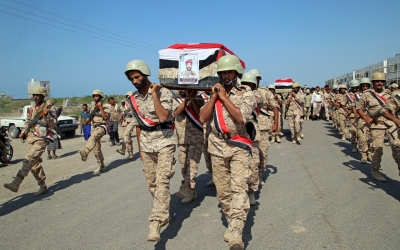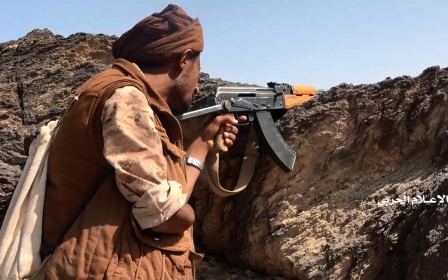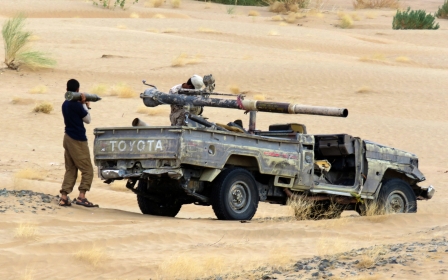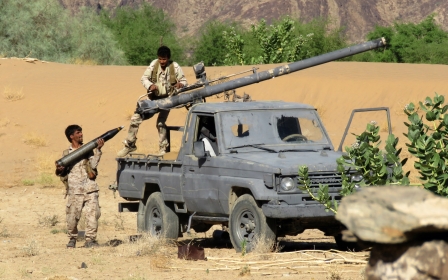Yemen: Displaced people in Marib live on edge of disaster as Houthis advance
Fleeing death and destruction, and displaced for the 13th time, Um Ameer and her four children left Al-Juba district, about 25km south of Marib city, the capital of the Yemeni governorate of the same name.
With nothing but the clothes on her back, she now finds herself in the wide-open desert of Wadi Abeida lacking the bare necessities for survival.
'We are in winter, we need blankets, beds, food and everything that may protect our children and keep us alive'
- Um Ameer, displaced mother of four
"It was a very bad night. We couldn't take anything with us. We heard explosions, bullets, and suddenly people were just escaping... we are done," she said with a tired and pale face.
"We are in winter, we need blankets, beds, food and everything that may protect our children and keep us alive."
Unfortunately, their suffering hasn't come to an end yet. Sporadic missiles and shells still threaten Um Ameer's family and others.
New MEE newsletter: Jerusalem Dispatch
Sign up to get the latest insights and analysis on Israel-Palestine, alongside Turkey Unpacked and other MEE newsletters
While she was preparing a breakfast of unclean water and flour in a small dilapidated tent, a projectile exploded 10 metres away, causing a great panic.
Houthi rebel forces have intensified their push towards Marib, hoping to seize control of its abundant oil resources and strengthen their position in peace talks with the internationally recognised government that had previously held the governorate as a major stronghold.
Marib lies about 120km east of the capital, Sanaa, which has been controlled by the Iran-aligned Houthis since 2014, when they ousted President Abd Rabbuh Mansour Hadi.
Um Ameer's family is one of thousands estimated to have been displaced as a result of the recent intensified fighting around Marib city.
"Most of the IDPs [internally displaced people] came from Al-Juba district, Jabal Murad district and other southern areas that witnessed intensified fighting," Fahmi Al-Zubairy, head of the Sanaa office of human rights told MEE.
"They are living in extremely difficult humanitarian conditions due to the absence of real response plans by the UN and other international organisations."
'During the three last months, more than 93,000 more have been displaced, bringing the total to over 2.3 million displaced people in the city of Marib since 2015'
- Khaled al-Shajani, IDP management deputy director, Marib
He added that there was a grave danger facing internally displaced people in light of the continued fighting, which he said was a violation of the Geneva Conventions.
Khaled al-Shajani, deputy director of the executive unit for IDP management in Marib, said the Houthis were engaged in "forced displacement".
"Before 2015, 450,000 people in total lived in Marib governorate. Since then, the number of IDPs alone has reached 2.2 million people.
"During the last three months, more than 93,000 more have been displaced, bringing the total to over 2.3 million displaced people in the city of Marib since 2015," he said.
"We have around 160 IDPs camps in the city, which represent 10 percent of the total displacement in the governorate. The rest are distributed in neighbourhoods, villages, and rural areas.
"Houthi advances in early 2020 in Al-Jawf governorate and [on] Marib's borders with Sanaa and Al-Jawf displaced nearly 25,000 families."
Humanitarian catastrophe
Following a four-year calm in fighting, since the beginning of 2020 the fight for control of the oil-rich region has become one of the bloodiest battles of Yemen's seven-year-old civil war.
The war has resulted in quarter-of-a-million deaths, more than four million people being displaced, an economy on the brink of collapse, and widespread communicable diseases, leading to what the UN has deemed the world's worst humanitarian crisis and leaving more than half of Yemen’s population at risk of starvation.
'We suffer from everything, after we lost everything... it's winter, we have children, we have nothing to protect them from cold weather'
- Saleh Mohammed, internally displaced person
About 10,000 people were displaced in October alone, in what amounts to the biggest wave of displacement recorded in a single month this year.
"We're also concerned now with the escalation in fighting around Marib. This has now added to additional displacement in that area, a place where we already have over a million people displaced," said David Gressly, UN resident and humanitarian coordinator for Yemen in remarks in Geneva.
The latest escalation in Marib has already displaced tens of thousands of civilians, almost all of whom are women and children, mainly from districts to the south of Marib city, which have witnessed fierce fighting lately.
Almost 90 percent of the IDPs in Marib are living in extreme poverty, according to the UN.
"In response to the IDP waves, Marib's governor, Sultan al-Aradah, directed funding to five sites which are being prepared and equipped as new IDPs camps," Saif Muthana, director of the executive unit for IDP management in Marib, told MEE.
Freezing cold camps
"It is the seventh time I and my family have been displaced," 42-year-old Ali Nassar Dohbool, who has a tent at Al-Nogia'a IDP camp in Al-Wadi district to the south of Marib city, told MEE.
"The last time we ended up at our relatives' house in Jabal Murad district. Then the war pushed us all again to flee. It is a long journey of suffering," he said.
People in the camps struggle to find basic necessities like food, medicine, water and shelter. Zubairy said it was the biggest wave of displacement ever recorded in the governorate and there were few resources available to accommodate it.
"We suffer from everything, after we lost everything... it's winter, we have children, we have nothing to protect them from cold weather,” said Ali Saleh Mohammed, a father of 10 children, who moved from Al-Jawf governorate when Houthi forces seized control of it last year.
Manal Abdu, a Yemeni nurse working at al-Khowlah IDP camp in Al-Wadi district, said the health situation was catastrophic.
"What international organisations and stakeholders neglect is that the desert is freezing cold and no one can bear it. They need blankets, electric heaters and other stuff to protect them from diseases that may afflict their health," she said.
“The influx of new IDPs has exacerbated the matter and made the suffering worse and worse."
Grim future
In a governorate with fragile infrastructure and an increasingly vulnerable host community, international organisations have become unable to alleviate the suffering.
A group of 14 international aid agencies operating in Marib issued a statement in early November voicing deep concern over the situation of IDPs there, while Unicef warned that that the latest surge of violence was exacerbating an already desperate situation for children, of whom an estimated 1.7 million are internally displaced in Yemen.
Dohbool said the aid agencies were "too weak and unorganised".
'We are afraid of the future... what if war reaches these camps?'
- Ali Saleh Mohammed, IDP
"They don't give us shelters, blankets and other living necessities, but instead give us soup and cleaning kits. We don't know, maybe they haven't reached us yet, maybe they will not come at all. We have no idea," he said.
Discussing the work of international organisations, Shajani said their handling of the IDP emergency had been irresponsible and non-neutral.
"We continue operating in a challenging environment, with a massive shortfall in funds, which is resulting in the current Marib response completely unable to deal with the crisis," a group of organisations said in a statement.
If Houthi fighters continue progressing towards Marib city, the international organisations and government authorities will face a massive humanitarian challenge in relocating and caring for hundreds of thousands of IDPs.
"We are afraid of the future... what if war reaches these camps?" asked Ali Saleh Mohammed. "We have nothing to do except pray to Allah to help us and keep our children safe."
This article is available in French on Middle East Eye French edition.
Middle East Eye delivers independent and unrivalled coverage and analysis of the Middle East, North Africa and beyond. To learn more about republishing this content and the associated fees, please fill out this form. More about MEE can be found here.





